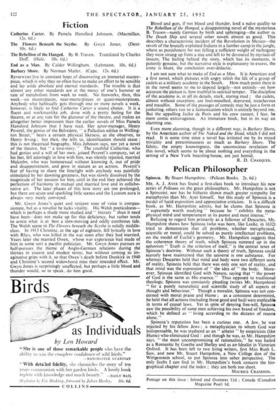Pelican Philosopher
MR. A. J. AYER has found a first-class book to introduce his new series of Pelicans on the great philosophers. Mr. Hampshire is not a Spinozist, nor has he hitherto shown much greater sympathy for metaphysics than Mr. Ayer himself, but this study of Spinoza is a model of lucid exposition and appreciative criticism. It is a difficult book, as Mr. Hampshire admits, but he claims that Spinoza is " supremely worth studying " because he " exhibits the meta- physical mind and temperament at its purest and most intense."
Refusing to regard him primarily as a follower of Descartes, Mr. Hampshire shows how Spinoza (who was born, like Locke, in 1632) tried to demonstrate that all problems, whether metaphysical, scientific or moral, could be solved as purely intellectual problems, on the model of Euclid's geometry. Mr. Hampshire suggests that the coherence theory of truth, which Spinoza summed up in the aphorism " truth is the criterion of itself," is the central tenet of Spinoza's doctrine. Without such a theory of truth,,Spinoza could scarcely have maintained that the universe is one substance. For whereas Descartes held that mind and body were two different'sorts of reality, Spinoza held that there was only one sort of reality, and that mind was the expression of " the idea of " the body. More- over, Spinoza identified God with Nature; saying that " the power of God is the same as His essence." Thus opposed to traditional theology, Spinoza was constantly pleading (writes Mr. Hampshire) " for a purely naturalistic and scientific study of all aspects on thought abd behaviour." Though a moralist, Spinoza was not con- cerned with moral praise and blame ; as a consistent determinist, he held that all actions (including those good and bad) were explicable in terms of causal laws. Yet in spite of denying free-will, -Spinoza saw the possibility of some men achieving his own brand of freedom, which he defined as " living according to the dictates of reason alone."
Spinoza's reputation has been a curious one. A Jew, he was rejected by his fellow Jews ; a metaphysician to whom God was indispensable, he was traduced as an " atheist " by empiricists (like Hume) who eliminated God : and though he was, as Mr. Hampshire says, " the most uncompromising of rationalists," he was hailed as a Romantic by Goethe and Shelley and as arridealist in Victorian Oxford. It has been left to two living writers, first Miss Ruth L. Saw, and now Mr. Stuart Hampshire, a New College don of the Wittgenstein school, to put Spinoza into sober perspective. The only faults I can find in Mr. Hampshire's book concern the bio- graphical chapter and the index ; they are both too short.
MAURICE CRANSTON.


































 Previous page
Previous page